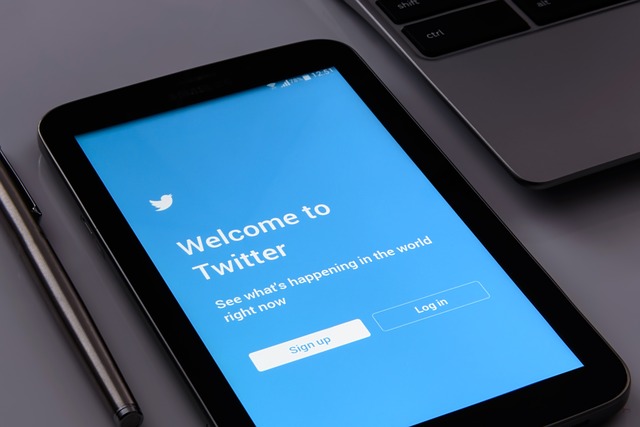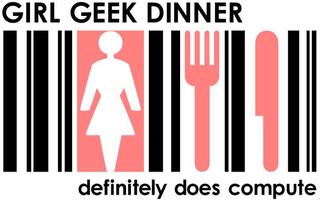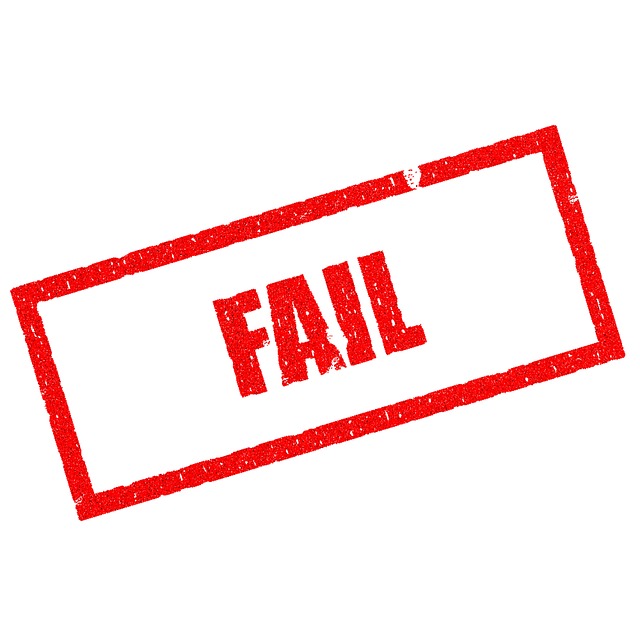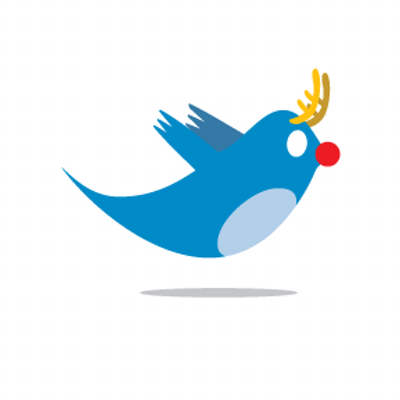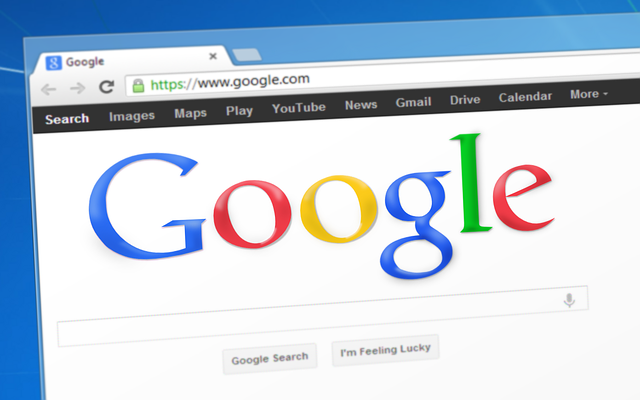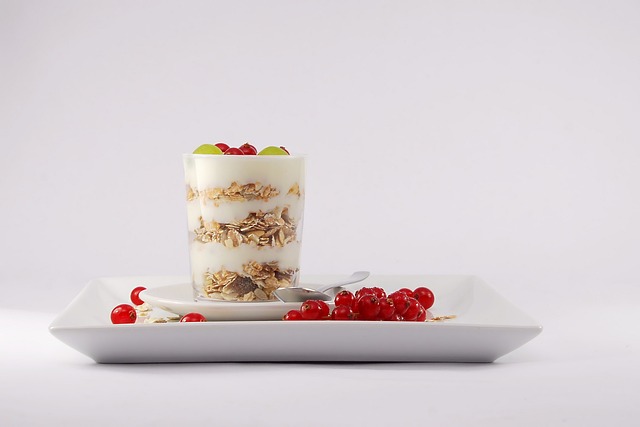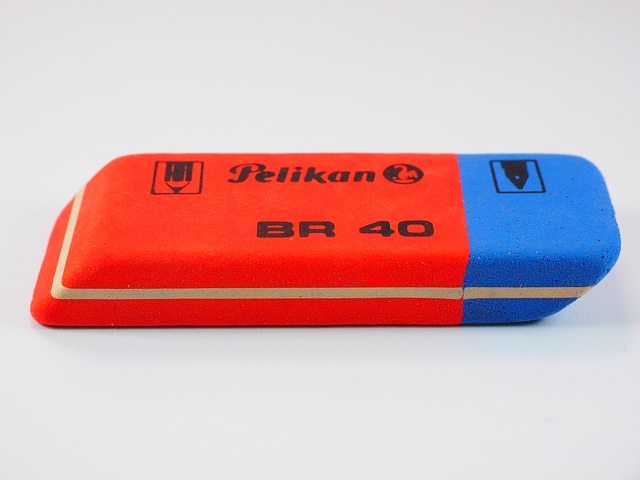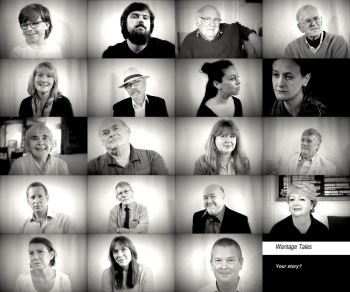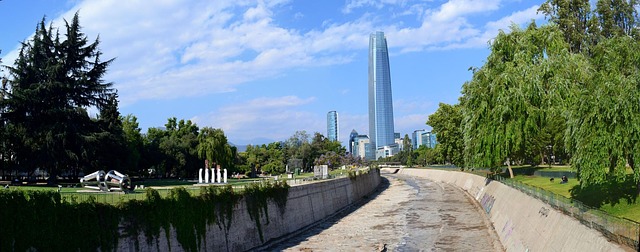-
My Top Blogging Tips 4: Various types of content and social media networks
Maybe in some cases, the design of our blog is awesome and drives a lot of traffic to the site but its real value lies in content. Now, most of us – the second wave of bloggers I happen to belong to – start our blogging with textual content, but it’s worth reaching out of our own comfort zone and adapt new tools, devices and share various types of content. Our kids are using digital cameras for fun so why would we not use it to bring more value and provide additional, visual experience to our readers? Our friends are using their iPhones to record short audio memos so why can we not use iPadio or Audioboo to run blog interviews and embed them on our site? And video content – it seems to be still the most popular type of sharing simply because it takes no times to view it and digest all messages.
But in some cases, we think that it’s not really worth the effort. Let me just suggest small steps. Try one of two new technologies. Ask your friends and family what is there, what they are using to share news and daily updates and adjust it to your blog, your needs. keep in mind that for the sake of promotion it’s better to use dedicated social networks and link to those from your site – this way you will reach multiple and well-targeted audiences. So embed Flickr widget or gallery on your site and keep uploading photos to your Flickr account. Start taking photos with your phone, share to Instagram and set it up to share to Flickr. This way they will also appear on your blog in Flickr widget. Saves you time and does the promotion for you.
Just one note on content: if you use photos or other types of content from various sites it’s a nice habit to mention the source – it also contributes to your own credibility! I strongly suggest using one of many and very flexible Creative Common licences for your texts, photos and other pieces of content. Add the licence to your sidebar – it means you are giving readers clear directions on how they can use your content. It also makes you look professional!
Be brave, engage and provide valuable experiences to your readers!
-
Organizations Don’t Tweet, People Do: A Manager’s Guide to the Social Web by Euan Semple
It took me a while to digest the content of “Organizations Don’t Tweet, People Do: A Manager’s Guide to the Social Web” written by Euan Semple. I started reading the book the first day it was published on Kindle but I had to stop few times digesting few chapters and moving on to the next part. I am not sure how about you but for me it’s very intense. I honestly did not know, still do not know how to post about it!:) But let me explain.
First of all there is the process. You are faced at first with a pretty shocking for some statement that each and every member of an organisation (and any web user for that matter) needs to take responsibility for their words and online actions. I think it’s not an obvious, yet extremely important statement to make. On a daily basis we see – and trust me, I catch myself on doing so as well – we see people blaming Facebook, Google, broadband suppliers for the quality of our online experience when really – the web IS what we make of it and we can make it work for us and for a better world (Euan’s final thought).
We could probably stop here, but it’s worth reading all other suggestions and points in between the opening and the ending of this book. It takes you on a journey through systems and platforms, through organisational challenges, lack or need to manage social media competence, personal barriers and very common assumptions we tend to make about the web, our personal need to express ourselves now finally available to all, the noise and its value, power of relationships and valuable conversations, great and over-complicated by social media “gurus” concepts like creativity, innovation, collaboration and strategic thinking…up to the final points on realistic risks and way to handle those. If you pick up this book, this is the journey you are facing and trust me – it feels good!:)
I think this book is universal. It can be a real eye-opener to web sceptics or employees faced with the sudden internal challenge of “embracing the social revolution”. It is a great medicine for those who might think they know the social web really well – no one really does and once you read the book you start to accept that…hey! it’s ok!:) It’s a school book, mandatory reading for any social media professional – like myself, you will end up taking notes, going back to particular sections, write them down and quote at work. It makes us all think.
If I put my blogger/social web user hat on I think this book will always be alive – I read it twice, I read few section again and again. It has changed me in two different ways. First of all, it has made me more confident that some of the social web concepts I am familiar with are right and put this knowledge (or maybe just the feel for the way things work) in the right boxes, order or balance – balance is probably the most suitable word here. On the other hand, once my basics have settled down I had to discover yet so many questions to answer – but it became clear to me that the only person to answer them is going to be…me. And the only way to find the answers to my new question is to try to do it all better!
While writing this post it somewhat became apparent to me how I feel about this book and Euan’s words – it feels like I am walking a path (maybe crowded pilgrimage or maybe just my own ascetic solitary road, maybe it’s not even relevant). It feels like I have met an undercover wise man who has joined me for a while on my path and with whom I have chatted my time away. It feels like I understood this co-passenger quite a lot and yet I feel even more confused. But the confusion after saying good bye and wishing each other a good continuation of our own paths actually feels good. I am left with very intense, heavy silence. The full of air part of half-empty glass – the one which – if we care to look at it this way – is actually always full.
Read it, let me know how it makes you feel!
-
My Top Blogging Tips 3: Plan your content and tonality
We all do it. We hate the word “strategy” yet we know what we want to do here, on our blog let’s say in the next few weeks – even if the plan is…not to plan, not to strategize, not to commit;) It’s important for our readers to know a little bit what to expect. I do not mean actually publishing your content plan or intentions but gradually building up your tonality, posting on particular topics, setting up the rhythm of your blog.
As readers, we want to feel the atmosphere of your blog. We want to know when to expect the next post – or not to wait for it, just check the site now and again. We want to know what types of topics your blog usually addresses and from that point of view, we do like consistency.
And then one day if anything changes we like to be guided into the change – we like to be told about a new event you are to attend and expected a rise in the volume of your posts. We like to understand why suddenly your blog has additional Flickr widget so that we check the blog in a browser, not only in RSS reader.
We are all learning this stuff and I am convinced that to some extent we are all experimenting with innovation. I just think that now and again it’s worth stopping, looking back and deciding how we take our blog to the next level.
I personally spend Christmas time on looking back at my year and around the end of the year I re-think my approach to blogging and the web in general. I am sure you can find your own best time and approach, but whatever you do – share it with your audience and educate them on the how of your blog – directly, though the way you do it or simply by consistency in your posts.
-
My Top Blogging Tips 2: Protect Your Relationships
The idea of management of our web shadow was probably clear to most of us for a while now – as we are all responsible for each other here, in on-line spaces. But it was really Antony Mayfield’s book that made it clear to me just how crucial it is to keep an eye on our own privacy and monitoring of on-line conversations around our own data (name, nickname, address, blog title, hashtags, etc). I strongly suggest it as one of the mandatory reads for everyone wishing to use the web wisely.
Writing up blogging tips for mothers present on-line has made me realise that increasingly we are becoming more and more responsible for our kids and their web shadow, for our friends and family, even for our work contacts. Increasing linking between social networks helps us to manage the noise and amount of updates we are to send to all our audiences but we need to be aware of consequences of various access levels we provide to 3rd party applications on Facebook, Twitter, Google+. Klout – Twitter grading service was strongly criticised for pulling in family members from Facebook and in some cases publicising relationship that its users were not even aware of! We have a lot of options to manage our data, our privacy levels and group our relationships in various categories – let’s learn to use those for the sake of our families and friends! Let’s start to expect the same from our on-line friends too!
Just as a side note from someone who talks to KS1 and KS2 kids about on-line behaviour I would like to point our that as parents we tend to overlook the fact that all the information we share about our kids on-line – even if it’s just a photo of a newborn baby or first day of school – contribute to their on-line footprint so we need to wisely consider what to share and what to leave for private on-line communication. I have no intention to scare you off from using social media, I would just like to see the confident and competent usage of on-line spaces in conversations about and with our kids.
-
My Top Blogging Tips 1: Publish a Disclosure
While I am preparing to the ActionAid UK Blogger Tea party this week I decided to post my top tips in separate blog posts – I think on Thursday I will only have few minutes to present so I would like to explain my points in more detail. I am starting with something pretty important to me (both as a blogger, as well as social media marketer who works will bloggers quite often) – disclosure.
When you start blogging you need to clarify the goals of your presence on-line. Sooner or later you might be approached by agencies or directly by brands or even by individuals asking you for article exchange, product review or involvement in an event for example. What would you do if someone posts a public comment asking you to post a review of a new baby product (please note: my audience on Thursday will consist mainly of blogging mothers)? Would you prefer to be contacted by email? Or maybe you would rather avoid any involvement with commercial brands? Increasingly our individual on-line reputation depends on how we get involved in promotional activities or any blogger engagement programmes. Me, for example, I avoid direct engagement with products that are not relevant to my audiences and topics of my blog. I am happy to learn and review new social media services or social media campaigns, often I do take part in events and nonprofit campaigns but always according to my personal preference and relevance to my blog (which is designed to be the extension of my geeky life, so it makes perfect sense). I receive quite a lot of pitches but I choose to stay away from many because they happen to be irrelevant to my site. I was once asked by an agency to take part in a project based around embedding of a branded widget on my site – and even though it was related to photography I did not like the idea of embeddable code and content which I cannot really control within my site. When I gently declined it was pointed out to me that I did indeed take part in a fairly commercial blogging give away – which I think was a very rude and ignorant response from someone who probably just started working with bloggers and does not realise that we do not really like to feel that pushy communication. Specially that in this particular case I was involved in a give away on my friend’s site and the topic was relevant to my hobbies.
What should we do to clarify our approach to our own blogging and how we expect to be involved with organisations and brands? Here are few major points:
1. Dedicate an area of your blog to clear statement on the topic – you can use your profile information area, contact page, about section or create a dedicated “disclaimer” page.
2. If you work is related to blogging, point out what on-line presences (Twitter, Facebook, Google+ profile) are personal (“Personal opinions only”) and where are your work related posts.
3. If you share a work related post with your personal networks, explain the context. Sometimes just tagging it #work does the job.
4. If you are involved in promotions, sponsored blogger events or any other activity which might mean that the content you are sharing is not purely YOUR opinion or is your opinion on a sponsored activity – make sure you explain your relationship with involved brands to your audience.
5. If you are paid to blog – find the appropriate moment to disclose that too.
As your readers, we want to know how you relate to what you post and what you experience off-line. As marketers we need your guidance on whether we can and if so then how can we approach you. As fellow bloggers, we want to link to your content with a ful understanding of its context.
-
Voice Social Media Breakfast – now on YouTube
It has been slowly 2 years since I started those virtual events. From chat – which was at the time the best forum for this group discussion – we have moved to Google+ Hangouts and today we have our notes for you…on YouTube. Our kind friend, Michael Tucker has spent his evening last night (11 AM GMT) recording our session for us and live-streaming it too and this evening we have it uploaded to YouTube too – for you reference.
Next time we will use Bambuser, just to see if we can improve on the image quality, though I think considering the fact that Google+ does not allow direct upload to YouTube this is a great achievement! Enjoy – it’s longish but it has some really good case studies there for social good and tech.
-
Oxford Girl Geek Dinners 3
..was a very nice evening, thank you to everyone who made it so!. I have learned that building community is a long term process and we need to take small steps but we do need to keep moving. I have been dragging organising of this particular event for quite a while now and I am happy that we have finally met! I have asked everyone for the feedback, so I should probably start. What worked?1. We had a lot of new people – which is great! One of the core ideas behind the GGD events is promoting the notion of women in tech and trust me: we had amazing guests this week!2. We had quite a few gentlemen – I personally like the idea of mixed group and the fact that it is not an event exclusively for women. We promote openness, so we should remain open!3. Networking and presentation – I like the balance of the two. I hope we can build on that in the future.What needs more work:1. Communication – keeping in touch with everyone interested. Let’s hope that the mailing list helps!2. More presentations – at the moment I am working a little bit in the dark, I would prefer to know what topics others are interested in and see other ladies presenting too – glad to see Kate and Wendy involved and others proposing new ideas.3. Dinner itself – we need more food. Pizza at least!So now over to you – what would you like to see at an event like this one? Let me know! -
Thank you to the people who inspired me in 2011!
As I am heading towards my next Birthday I decided to extend my period of evaluation of 2011 and I would like to thank few people who have inspired me last year. I want you to know them too, because they are worth following on Twitter and talking to! Some of those people were my clients, others I have met at events. Some of them I have been in touch over e-mail, social media. Others I have met in person. All of them have shaped me into a better person. So, here is my thank you list though I am sure this is just a small chunk of all great relationships I got to benefit from in 2011!
Louise Odquier from ActionAid UK
I have worked with Louise on a pretty complex project in January and I have learned that in some cases you need to be patient with your expectations. Thank you for that, Louise!
I have worked with Gabriela a lot in 2011 and I have to say that she has been a great inspiration to me. I have learned, sharpened my balance between work and life, seriousness and smile. Thank you, Gabriela!
I have worked with Richard but we have also met in few events in 2011. He was always extremely engaging and energising. He was very open to new ideas and always took notes when new ideas were on the table! Thank you, Richard!
Howard has been great in sharing all the new tools and ideas with me in 2011. In terms of social media, he was always there to discuss the new developments! Thank you, Howard!
After few presentations at Barcamp UAE over Skype and various conversations in social media this summer I have finally met Kedar in London! It’s a great feeling to meet someone “again”, sit down and have a beer while discussing current trends in social media and sustainability. Thank you, Kedar!
We have worked together a while ago, so it was really good to see Deepak back in London in 2011. We had a good meetup-crawl and series of really inspiring conversations about the future of social media consultancy. Thank you for that, Deepak!
I have been really happy to meet Claire in London and quite recently in a very relaxing small tweetup in our area too – we both seem to be busy, but we finally had an opportunity to sit down and chat a bit. Claire has thought me to take time, though she probably does not realise it;) Thank you, Claire!
Lucy has tought me balance and inspired me to experiment with new ideas! Thank you for that, Lucy!
Amy has been a great networker and such a kind person to me in 2011! She has that thing that makes people listen! Thank you, Lucy!
Renata Avila from CC and Global Voices
I love Ranata for her enthusiasm and amazing smile! She is so supportive! She completely astonished me in summer when I looked for “a Spanish Catalan and/or Swedish” speaker introducing me to a great person who speaks both languages! All this within a day! Thank you for all your kindness, Renata!
Catherine Woodhead from Prince’s Foundation
We have collaborated on a pretty huge project and I have learned that the real change needs consistent approach and a smile! Thank you, Catherine!
Euan has been a great mentor to me in 2011. His book published in December has thought me…gosh, not sure where to start…I will blog about it separately…it has made me more confident in truths about tech I believe in and opened my eyes to new ideas that I was yet unable to define. Thank you, Euan!
David Dixon was really, really supportive and thought me few basic truths about fundraising. I am really, really grateful for that! Thank you, David.
Nick has thought me to be positive! Sounds easy, but 2011 was sometimes a bit challenging to me and I think I could have coped with some changes better. Nick reminded me that we create our own happiness every minute! Thank you, Nick!
There are two very close friends – Agnieszka and Krysia. I would like to thank them simply for being there.
But most warm thank you goes to the geek who makes my every single day happy – @zerolab. I have no words how much his friendship means to me, so let me just say simple thank you!
-
Please do not use the word “blog” when talking about blog posts
Yet again today I was faced with confusion around the notion of calling your blog posts “blogs”. I have been thinking about the need to write it up in a blog entry myself for quite a while now because increasingly I seem to suffer from genuine series of misunderstandings when training, mentoring or simply chatting to people about blogging. I have also noticed that many fundraisers in the UK moving into digital tend to use the term “blog” incorrectly. That is if we assume that we should not call our blog entries “blogs”.
Just for example if you check out the website of one the leading UK fundraisers (and from what I have seen over at IoF National Convention a celebrity of this industry) Ken Burnett, you will see that he refers to blog entries as “blogs”. You can click though to his “blogs” (meaning recent blog posts) and you can subscribe to his “blogs” (i.e. blog entries) over e-mail. Please do not get me wrong – I do not intend to criticise Ken Burnett, I actually think his input into the development of UK fundraising is immense. What I am worried about is the vague social media terminology we seem to accept not even realising that it might not be correct. And if trusted people in a particular industry use this terminology incorrectly, we will see more and more young fundraisers using it the same way too.
The real problem here is the fact that digital, tech and social media – or whatever definition you use to describe new social web – bring a lot of new practices, tools and notions that we need to learn to describe in a consistent way. Blogging is not new, but it has been introduced to the mainstream media and many industries in times of Facebook’s and Twitter’s popularity so many new users (even if established voices in other areas of life) do not really understand the basics of blogging. On the top of that you will find that the social media marketing industry is not helping. We, social media practitioners, are focusing on even more complex topics and keep forgetting that we do live in our little geeky box – at least I feel this way. On a daily basis I work and live with people who ask me about various elements of the web for their daily work and passions. The more I do it the more I start to realise that we need to speak the same language instead of developing a new one.
What is the standard and the real meaning of “blog”, you will ask me. I could write a long blog post evangelising (preaching about) the correct meaning of the word “blog” but I am not a guru – I decided to ask some of the most established technology and social media voices in the UK and globally – just a few – to answer this question for me. I am happy to see they all agree with my take on the topic.
Euan Semple responded to my question:

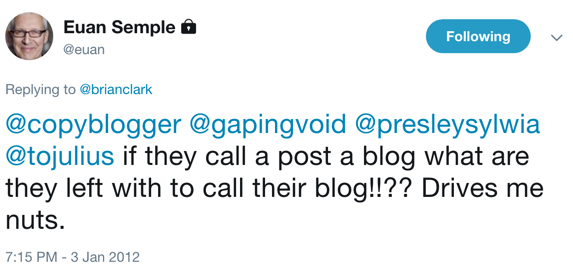
Julius Solaris was also moved by the topic:



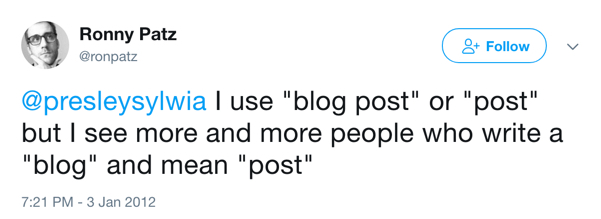

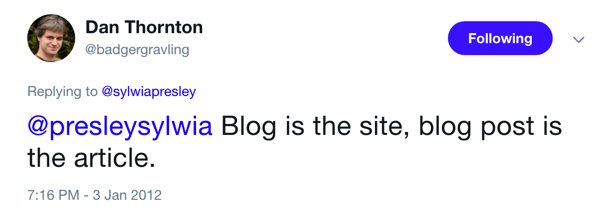

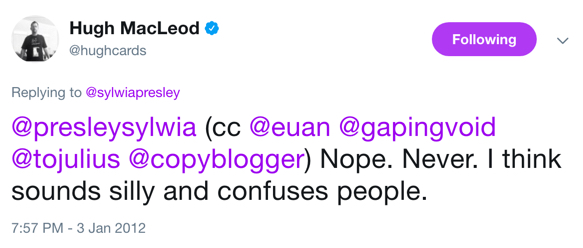
I had mixed responses from some of my friends and followers who joined social media spaces few years ago, like for example Patrick, though he later corrected himself:

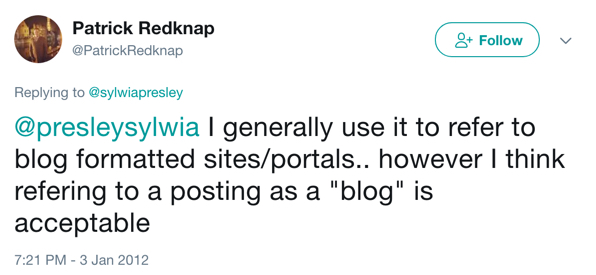
Few people mentioned that the right to call a blog entry “blog” should belong to the author of the on-line journal. When I check the on-line versions of Oxford and Cambridge Dictionary I did not find “post” as an additional meaning of the word “blog”. “Blog” is defined as follows:

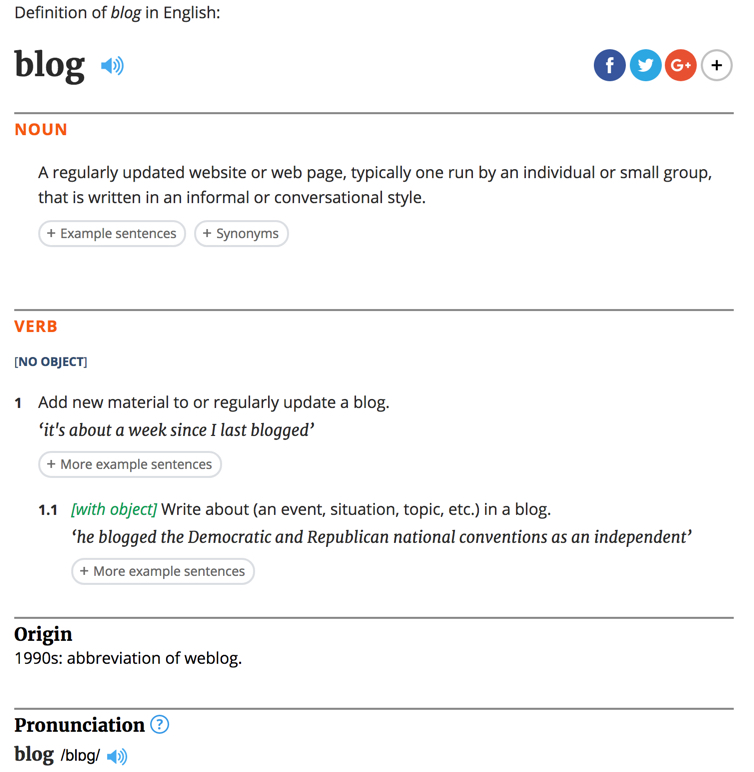
Now as a linguist I know that many words in our languages change with time. They adopt new context and move into new idiomatic expressions, but in case of “blog” vs. “blog post” we need to be really, really careful, because if we get it wrong we cause misunderstandings. The other day someone who does not blog at all told me that he published few blogs – which was really surprising, but only when I have received the links I realised that the person meant blog entries, articles written as guest blog posts. So I was continuing our chat basing my further recommendations on wrong assumption and instead of discussing guest posts I talked about blogging platforms and content aggregation!
I was told today that I am moving into dangerous grounds of yet another theoretical discussion about terminology. It is indeed difficult to decide what terms we should be using and how we should talk about our social media activities. I think however that some basic terms remain clear and obvious. The word “blog” was around for slowly 13 years, so I think it’s time to coin its proper usage. Instead of just taking a new word for granted let’s check how it’s used by the industry leaders – leading bloggers in this case. If bloggers know what a “blog” is, let’s trust them;)
-
Top 5 Coffee Infographics of 2011
2011 was a year of some amazing infographics to me so I have decided to pick my personal top 5 ones dedicated to coffee. In case if you are wondering what else was there this year, check out my small collection on Pinterest here. I will not include the most popular one here as I was unable to identify if it was made in 2011, apologies!
1. US Speciality Coffee Consumption Statisttics – it does not contain a lot of data, but I am glad to see the mentioning of Facebook topics there, as well as design, the feel and overall look of this particular infographic.


2. 50 Ways to Drink Your Java – it’s personal;) I love the look of this one. It reminds me of endless hours in coffee shops of Budapest; of all the quick, warm and terrible coffees I had on the way to my university just to wake up and of that one strong espresso we had with a friend in an amazing place in Vienna, then in Nice, in Verona, in San Sebastian during the best trip of my life once….:)


3. Fair Trade infographics from GOOD – we have seen quite a few good infographics on this site in 2011, so it would be unfair to me not to mention them here. Especially that they actually posted this one and I think for all Fair Trade fans it’s a good place to start;)


4. Coffee Travels – this is yet another take on the coffee trade. I really like the design and the feel of this one!


5. In Caffeine We Trust – I simply love the retro, industrial look and the entire idea of taking an online trend and placing it in our hands to fill out!:) Brilliant!


These are my favorites from 2011, but I would also like to mention one which did not deserve the title of “coffee infographics” yet I love the appearance coffee makes on it! Besides have you EVER seen more awesome CV?;)


I think 2011 was in many ways a year of release of data, data trends and trend to love data! We saw it finally presented in a more digestible way. We see it entering the interests of the general public through infographics so why not to make the most of it? In 2012 I would like to collaborate on an infographic project myself – I made that promise to myself. I think it’s important to make data, any data accessible and simple visualisation is one of the many ways it can be done.
I also hope that infographics will begin to move towards video format too! This one is an oldie, but goodie. Let’s hope that in 2012 we will see more of this stuff! If I am not around tomorrow, have a brilliant 2012 all!



